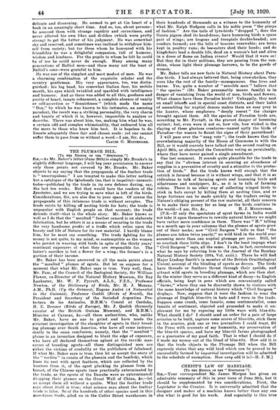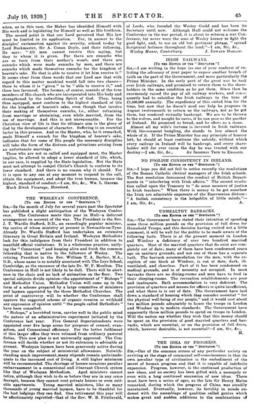CHRIST'S LAW OF MARRIAGE.
[To THE EDITOR OF THE "SPECTATOR.") SIR,—Your correspondent Mr. James Morgan has given an admirable summary of this in your issue of June 26th, but it should be supplemented by two considerations. First, the Legislator is the Creator. It is universally admitted that the designer and maker of a machine knows better than any one else what is good for his work. And especially is this true
when, as in this case, the Maker has identified Himself with His work and is legislating for Himself as well as His brethren.
The second point is that our Lord perceived that His law must be limited in its application. - For, in answer to the disciples' exclamation against its severity, echoed to-day by Lord Buckmaster, Sir A. Conan Doyle, and their following, He says: "All men cannot receive this saying, but they to whom it is given. For there are eunuchs who are so born from their mother's womb, and there are eunuchs which were made eunuchs by men, and there are eunuchs which made themselves eunuchs for the kingdom of heaven's sake. He that is able to receive it let him receive it." It seems clear from these words that our Lord saw that with regard to this matter mankind would fall into two classes— those to whom it is "given" to be "able to receive it," and those less favoured. The former, of course, consists of the true members of His church who are incorporated into His body and strengthened by the indwelling Spirit of God. They, being thus equipped, must conform to the highest standard of life for the kingdom of heaven's sake, even though that involve their making of themselves eunuchs, i.e., either refraining from marriage or abstaining, even while married, from the use of marriage. And this is not unreasonable. For the Christian view of life is that its ultimate aim is the glory of God by the development of character. Suffering is an essential factor in this process. And so the Master, who, be it remarked, made Himself a eunuch for the kingdom of heaven's sake, indicates that for some of His people the necessary discipline will take the form of the distress and privations arising from an unfortunate marriage.
Those who are not so called' and equipped must, the Master implies, be allowed to adopt a lower standard of life, which, in our case, is supplied by the State legislation. But the State must not attempt to compel Christ's Church to conform to its lower standard. And there is no reason why it should. For it is open to any one at any moment to respond to the call, obtain the equipment, and adopt the true human, because the highest, standard of conduct.—I am, Sir, &c., Wm. L. Chtovas.
Much Birch Vicarage, Hereford.



































 Previous page
Previous page